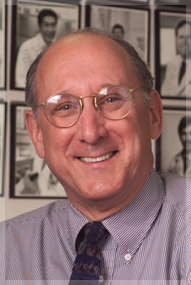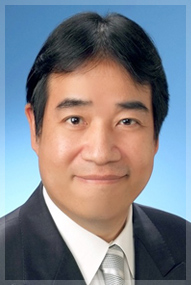The 2012 Keio Medical Science Prize Awardees
Steven A. Rosenberg, M.D., Ph.D.

Chief of Surgery, National Cancer Institute, National Institutes of Health
Website
National Cancer Institute
Reason for Selection
Development of Effective Immunotherapies for Patients with Cancer
Dr. Steven A. Rosenberg has pioneered the development of innovative immunotherapies for patients with cancer. Dr. Rosenberg was the first to develop an effective immunotherapy for human cancer by showing that stimulation of the human immune system with interleukin-2 could cause durable regressions in patients with metastatic melanoma and kidney cancer. He identified human anti-tumor lymphocytes and used them to characterize dozens of human tumor antigens that have been widely used in the study of cancer vaccines. Dr. Rosenberg developed a new approach to treating cancer using the adoptive transfer of anti-tumor T cells that could lead to durable, complete cancer regressions. His recent work using genetic engineering to develop anti-tumor immune lymphocytes by inserting genes that encoded antigen specific T cell receptors or chimeric antigen receptors was the first to successfully treat patients with advanced metastatic melanomas, sarcomas and lymphomas refractory to standard therapies. Thus, Dr. Rosenberg has made outstanding contributions both in the fields of basic tumor immunology as well as cancer immunotherapy.
Background
- 1963-1964
- Internship, in Surgery, Peter Bent Brigham Hospital, Boston,
Massachusetts - 1964-1968
- Graduate Student, Department of Biophysics, Harvard University
- 1968-1969
- Resident, in Surgery, Peter Bent Brigham Hospital, Boston, Massachusetts
- 1969-1970
- Research Fellow in Immunology (with Dr. John David),
Harvard Medical School, Boston, MA - 1970-1972
- Clinical Associate, Immunology Branch,
National Cancer Institute, Bethesda, Maryland - 1972-1974
- Resident, in Surgery, Peter Bent Brigham Hospital,
Boston, Massachusett - 1974-Present
- Chief of Surgery, National Cancer Institute,
Bethesda, Maryland - 1979-Present
- Professor of Surgery,
Uniformed Services University of the Health Sciences, Bethesda, MD - 1988-Present
- Professor of Surgery - George Washington University
School of Medicine and Health Sciences, Washington, D.C.
<Major Honors and Awards>
- 2011
- William B. Coley Award for Distinguished Research
in Basic and Tumor Immunology, Cancer Research Institute - 2006-2007
- Sergio Lombroso Award in Cancer Research,
Weizmann Institute of Science - 2006
- American Surgical Association Medallion
for Scientific Achievement - 1991
- Karnofsky Prize, American Society of Clinical Oncology
- 1996
- The John Wayne Award for Clinical Research,
Society of Surgical Oncology
Hiroyuki Mano, M.D., Ph.D.

Professor, Jichi Medical University
Project Professor, The University of Tokyo
Reason for Selection
Discovery of a lung cancer oncogene EML4-ALK and development of molecular targeted therapy
Dr. Hiroyuki Mano identified an EML4-ALK fusion gene from human lung cancer by using a retroviral functional cDNA cloning method, and demonstrated, by generating transgenic mice with the fusion gene, that the fusion gene can cause lung cancer, and also that ALK inhibitors suppress the tumor growth in the mice. These findings indicate that fusion genes generated by chromosomal translocations may also be important as oncogenes and serve as major drivers of the development of solid cancers in addition to hematological malignancies, for whose genesis this mechanism has been known to be important. Dr. Mano also developed the EML4-ALK diagnostic method and established a consortium for the diagnosis of patients, which led to demonstration of the strong anti-tumor effects of ALK inhibitors in a clinical trial. Dr. Mano has also reported on the mechanisms of development of drug resistance and novel fusion genes causing lung cancer. Therefore, Dr. Mano, through translational research, has made outstanding contributions to the advancement in our understanding of cancer biology and to the development of a novel cancer therapy.
Background
- 1984
- Graduated from School of Medicine, Faculty of Medicine, The University of Tokyo
- 1984-1986
- Resident in Internal Medicine, The Tokyo University Hospital
- 1986-1989
- Clinical Fellow, The Third Department of Internal Medicine, Faculty of Medicine, The University of Tokyo
- 1989-1991
- Postdoctoral Researcher, Department of Biochemistry, St. Jude Children's Research Hospital, USA
- 1991-1993
- Assistant Professor, The Third Department of Internal Medicine, Faculty of Medicine, The University of Tokyo
- 1993-2001
- Associate Professor, Division of Functional Genomics, Jichi Medical University
- 2001-present
- Professor, Division of Functional Genomics, Jichi Medical University
- 2009-present
- Project Professor, Department of Medical Genomics, Graduate School of Medicine, The University of Tokyo
<Major Honors and Awards>
- 2008
- Medical Award of The Japan Medical Association
- 2010
- The Takeda Medical Prize
- 2010
- Uehara Award
- 2011
- Takamine Memorial Daiichi Sankyo Prize
- 2011
- The Commendation for Science and Technology by the Minister of Education, Culture, Sports, Science and Technology
